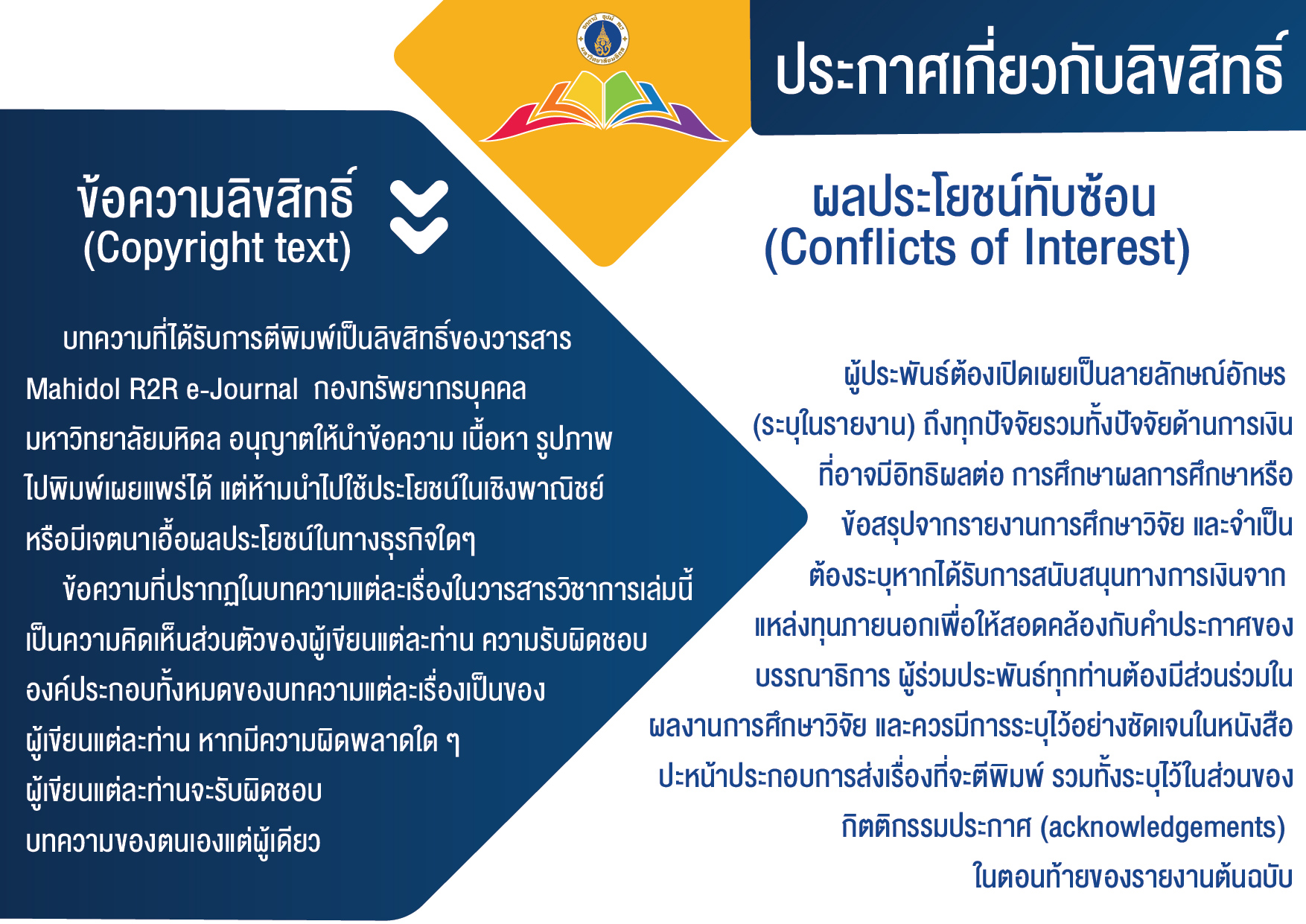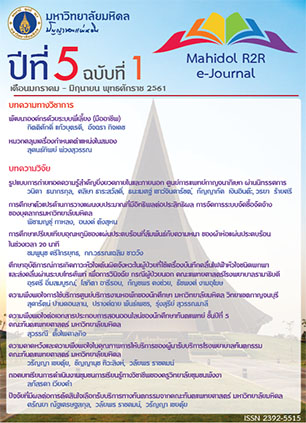พัฒนาองค์กรด้วยระบบพี่เลี้ยง (มืออาชีพ)
DOI:
https://doi.org/10.14456/jmu.2018.2คำสำคัญ:
พี่เลี้ยงมืออาชีพ, ระบบพี่เลี้ยง, การพัฒนาองค์กรบทคัดย่อ
ยุคโลกาภิวัตน์ หรือโลกานุวัตร (Globalization) เป็นช่วงเวลาที่ประชากรของโลกถูกหลอมรวมกลายเป็นสังคมเดี่ยว ปัญหาระดับต้นๆ ขององค์กรใหญ่ๆ ใน “ยุคโลกาภิวัตน์” คือการเคลื่อนย้ายแรงงานอย่างเสรี และรวดเร็ว ทำให้องค์กรมีการพัฒนาด้านการดำเนินงานและการพัฒนาพนักงานที่ไม่ต่อเนื่อง สิ่งสำคัญที่องค์กรจะต้องทำคือการทุ่มเททรัพยากรในการฝึกอบรมพนักงานใหม่เพื่อทดแทนพนักงานที่ลาออกไป กระบวนการเหล่านี้ทำให้องค์กรต้องเสียทรัพยากรทางด้านแรงงาน และต้นทุนในการดำเนินการ บทบาทสำคัญนี้จึงเป็นหน้าที่ของผู้ให้คำปรึกษาในหน่วยงาน ซึ่งมีความเชี่ยวชาญและประสบการณ์เข้ามาทำหน้าที่เป็นพี่เลี้ยงเพื่อเพิ่มทักษะและความสามารถให้น้องเลี้ยงในการปฏิบัติงาน หรือแม้กระทั่งการปรับตัวให้เข้ากับงานในความรับผิดชอบได้อย่างมีประสิทธิภาพ
ระบบพี่เลี้ยง (Mentoring System) มีความสำคัญที่จะช่วยแก้ไขปัญหาเหล่านี้ โดยพี่เลี้ยงมีบทบาทหน้าที่ในการชี้แนะ ถ่ายทอดความรู้ และสร้างแรงจูงใจให้แก่พนักงาน เพื่อให้พนักงานสามารถปรับตัวเข้ากับองค์กร สามารถทำงานร่วมกับผู้อื่นได้อย่างมีประสิทธิภาพ นอกจากจะเป็นการพัฒนาตัวพนักงานเองแล้วยังเป็นการสร้างพื้นฐานความมั่นคง และยั่งยืนให้กับองค์กร และนำไปสู่การลดจำนวนอัตราการลาออกของพนักงานได้
เอกสารอ้างอิง
Blessing F. Adeoye, & Lawrence Tomei. (2014). Effects of Information Capitalism and Globalization on Teaching and Learning. Pennsylvania: IGI Global.
Carlos Parada. (1997). Greek Mythology Link. Retrieved from http://www.maicar.com/GML/AboutGML.html.
Center for Health Leadership & Practice Public Health Institute. (2003). Mentoring guide a guide for mentors. Retrieved from http://www.rackham.umich.edu/.
Chronus. (2017). How Do Companies Use Mentoring in the Workplace?. Retrieved from https://chronus.com/.
Conway Cassandra Sligh. (2018). Faculty Mentorship at Historically Black Colleges and Universities. Pennsylvania: IGI Global.
Eby L T, Lillian T. Eby, Tammy D. Allen, Sarah C. Evans, Thomas Ng, & David DuBois D. (2008). Does mentoring matter? A Multidisciplinary meta-analysis comparing mentored and non-mentored individuals. Journal of Vocational Behavior, 72(2), 254-267.
Homer. (2001). The Odyssey: The modern translation of Homer’s Classic Talf. New York: Tom Dorherty Associates.
James A. Wiison, & Nancy S. Elman. (1990). Organizational benefits of mentoring. Academy of management executive, 4(4), 88-94.
Lois J. Zachary. (2011). The mentor's guide: facilitating effective learning relationships. (2nd Editions). California, CA: John Wiley & Sons.
Michale Abby Muvuso. (2007). Mentoring as a knowledge management tool in organizations. Master of Philosophy, Stellenbosch University. South Africa.
Pauline C. Beecroft, Susan Santner, Mary Lee Lacy, Lucy Kunzman, & Frederick Dorey. (2006). New Graduate Nurses’ Perceptions of Mentoring: six-year programme evaluation. Journal of Advanced Nursing, 55(6), 736-747.
Sharon E. Straus, Mallory O. Johnson, Christine Marquez & Mitchell D. Feldman. (2013). Characteristics of successful and failed mentoring relationships: A Qualitative study across two. Academic Medicine, 88(1), 82-89.
Sheila L. Croucher. (2014). Globalization and Belonging: The Politics of Identity in a Changing World. Maryland: Rowman & Littlefield.
ดาวน์โหลด
เผยแพร่แล้ว
ฉบับ
ประเภทบทความ
สัญญาอนุญาต




